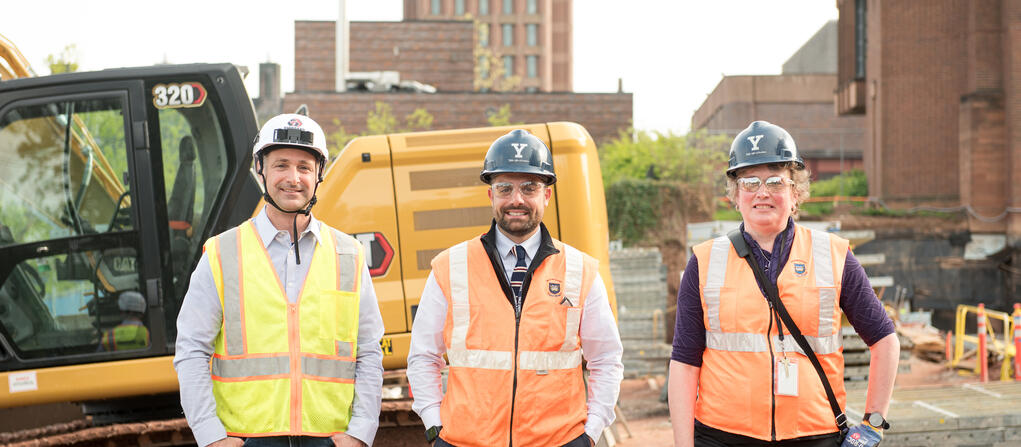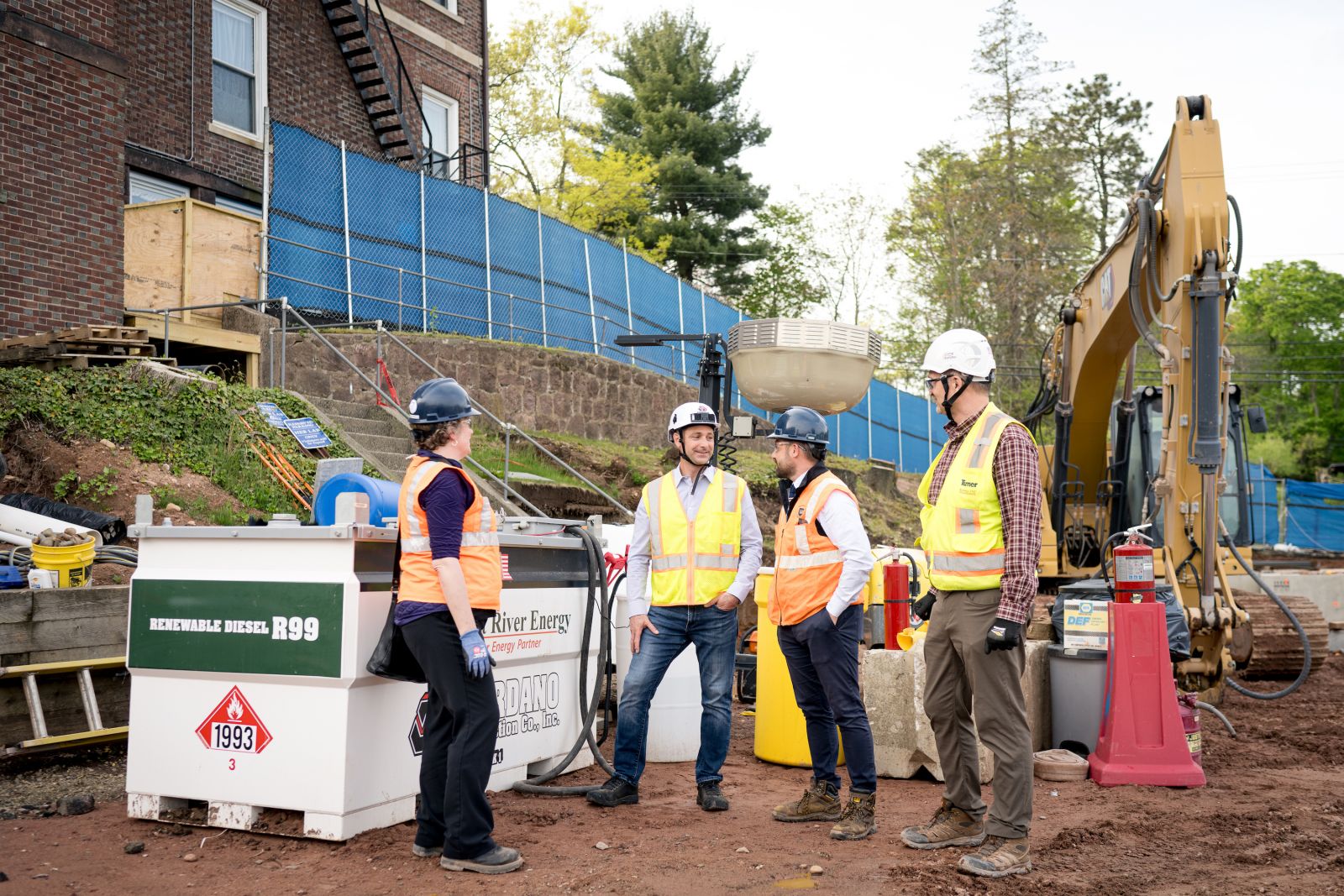
On Science Hill, there is a real-world lesson in renewable energy taking place—one that’s happening outside the labs and classrooms.
A fleet of bulldozers, excavators, and dump trucks have been working for months to prep the ground for the start of what will be the largest facilities project in Yale’s modern history: the Upper Science Hill Development. When completed in 2030, an expansive series of new and renovated buildings will serve as a hub for Yale’s work in quantum and materials science, physics, applied physics, advanced instrumentation development, and other emerging scientific fields.
With its trucks and hard-hats, the Science Hill job site resembles any other, with one key difference: there are no plumes of black exhaust pumping out of the machines. That’s because the construction equipment is running on R-99 fuel, a cleaner burning alternative to diesel that is made from waste cooking oils.
Sometimes referred to as “renewable diesel” or “green diesel,” R-99 can be used directly in place of petroleum-based diesel or blended with it. Yale’s construction contractors are using R-99 on Science Hill as part of the university’s multifaceted climate action strategy to reduce campus emissions to zero no later than 2050.
Though not yet in wide use, R-99 has shown potential as a greener alternative to standard diesel fuel. In a U.S. Department of Energy study, UPS delivery trucks tested with R-99 showed a consistent 4.2% reduction in tailpipe CO2 emissions and a 4.1% reduction in nitrogen oxides compared with conventional diesel. Likewise, a study by the California Air Resources Board showed that R-99 reduced carbon intensity—defined as the amount carbon dioxide released to produce a kilowatt hour of electricity—by an average of 65% when compared with petroleum diesel.
“We are always striving to think innovatively when it comes to instituting sustainability into our construction practices, and in this case, the use of R-99 fuel helped this cause,” says Shellie Anello, a Yale Office of Facilities construction project manager overseeing the Upper Science Hill Development.
Overcoming Obstacles
The search for a greener fuel source began before ground was broken on the Upper Science Hill Development. At Yale’s request, the contractor overseeing the site preparation work, Giordano Construction, initially sought out zero-emission battery-powered construction equipment. But the company soon learned the technology isn’t yet a match for a job of this scale.
“We found battery-powered excavators that are 1.5 tons, the really little ones, but the battery life was only about four hours,” explains Vincent Giordano III, project executive at Giordano Construction. “We run 25- to 40-ton machines for eight-plus hours a day, so that didn’t suit our needs.”
Recharging the batteries would have posed another challenge: the most common method is to use diesel generators, which negates much of the benefit of using battery power in the first place.
That led Giordano and the Yale Facilities team to R-99. Though the fuel is not widely distributed on the East Coast, they managed to find a local supplier, East River Energy in Guilford, Connecticut. The feed stock for the fuel comes from waste cooking oils that are collected from restaurants and refined at a facility in Albany, New York.
Before they could deploy R-99 on the job site, however, they had to overcome some ingrained skepticism. For instance, in order to satisfy all warranty requirements for the construction equipment, the fuel had to undergo a series of tests at a Caterpillar fluid analysis lab in Newington, Connecticut.
“The construction industry is very cautious,” explains Giordano. “These machines are expensive, and people are somewhat reticent to put a new fuel into them.”

‘As long as there are restaurants, we’ll have a steady supply’
The Yale project team is pleased with the performance of the R-99 fuel so far and see a host of benefits. First, it is a “drop-in replacement” for petroleum diesel, meaning it can go directly into engines without any costly retrofits. And unlike some biofuels that gel in cold weather, R-99 performs well to negative 10 degrees Fahrenheit. Lastly, it is a form of locally sourced, renewable energy that makes use of a waste product.
“As long as there are restaurants, we’ll have a steady supply,” Giordano says.
One of the biggest tangible benefits is improved indoor air quality, especially in the Class of 1954 Chemistry Research Building at 275 Prospect St., which sits adjacent to the current construction site.
“Typically, major construction equipment runs off of diesel fuel, which produces undesired diesel fumes,” says Bryan D’Orlando, associate director of construction project management in the Yale Office of Facilities. “With the use of R-99 fuel, we have eliminated the risk of diesel fume exhaust getting into the adjacent air intake.”
The current work on Science Hill is to make way for a new Chemical Safety Building, a facility to store chemicals used in scientific work, and using R-99 on this phase alone will save an estimated 60,000 gallons of petroleum diesel from being burned.
Taken together, the benefits have made R-99 well worth the slightly greater expense, currently around $0.30 per gallon more than standard off-road diesel. “That is a slight added cost for a potentially much greater benefit in the continued fight against climate change,” says D’Orlando.
If R-99 has a downside, D’Orlando says, it’s that the supply chain is presently limited. “The demand, at least in the New Haven area and Connecticut more broadly, is not great,” he says. “Establishing a more robust supplier network here would help lower costs and provide more flexibility with its delivery cadences.”
R-99 is also powering some of the construction equipment at Yale Golf Course as part of a restoration project there. Giordano Construction anticipates needing 30,000 gallons of fuel to power their machines over the life of that job, representing a significant savings in CO2 emissions compared to using conventional diesel fuel.
The Upper Science Hill Development team, meanwhile, plans to continue using R-99 in future Science Hill projects that are slated to commence shortly—and to share information about the fuel with colleagues for potential use on other Yale construction projects.